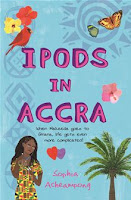205. IPods in Accra by Sophia Acheampong

IPods in Accra (Piccadilly, 2009; 185) by Sophia Acheampong continues the story of young Makeeda as she searches for her root. In this story, Makeeda is a bit older, is studying to write her GCSE exams and (un)working on her relationship with Nelson. It has all the ingredients of a good chicklit and a YA. The love is not steamy but juvenile, like we all do. The questions that Makeeda has to find answers to are everyone's problem. Her relationship with Nelson isn't work; meanwhile she has found that there is something between her and her Maths home-tutor, Nick. Now, she must go through all the burdens of breaking up safely with Nelson and work her way into Nick's heart. As if this isn't complicated enough, Nick, himself, is now 'going-out' with an eye-popping belle. The situation is now tensed and her friends, with whom she would have shared her problems, are now also dealing with similar matters, some of them becoming distant as a result. If combinin...
